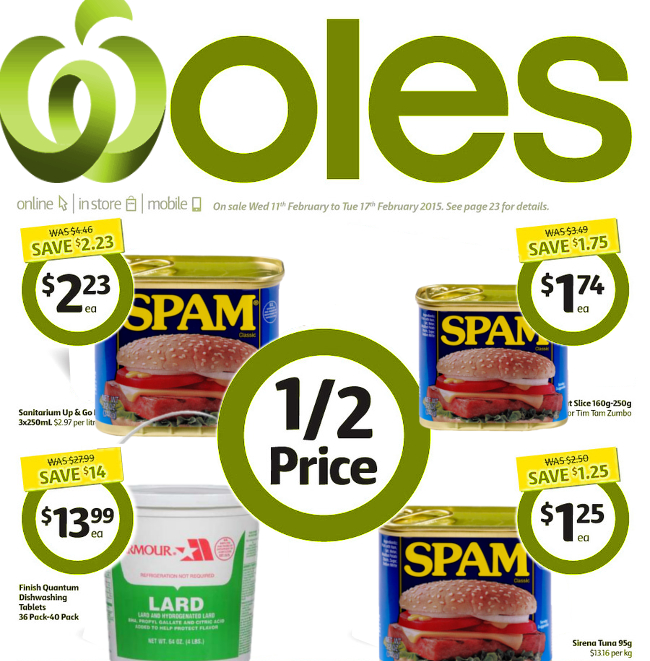Catalogues plug cheap obesity
 Junk mail promotes junk food – that is the finding of a new study into the health benefits of the most heavily-promoted foods in supermarket catalogues.
Junk mail promotes junk food – that is the finding of a new study into the health benefits of the most heavily-promoted foods in supermarket catalogues.
It appears that the letterbox spam from our major chains has about as much nutritional value as actual Spam.
Researchers from Deakin University assessed the catalogue content of the four leading Australian chains - Coles, Woolworths, Aldi, IGA.
Across all the chains combined, they found the majority of the foods advertised (66 per cent) were not among the core foods recommended for a healthy diet.
They compared the foods advertised in 12 weeks of catalogues, grouping the products into the four categories based on the Australian Guide to Healthy Eating:
- foods in the five core food groups that should be consumed daily and in wide variety such as, fruits, vegetables, dairy, meat, grains and water
- discretionary foods that should be eaten only sometimes, such as soft drinks, confectionery and chocolate, chips, desserts and ice creams, unhealthy ready meals, processed meats, jams, energy drinks, cordial, fats and oils
- alcohol
- other foods - including products such as tea, coffee, natural sweeteners, salad dressing, sauces, salt, breakfast spreads, infant food products, herbs and spices.
Overall, 34.2 per cent of advertised foods were in the five core food groups recommended for daily consumption, 43.3 per cent were discretionary foods, 8.5 per cent were alcohol, with the remaining 14 per cent categorised as ‘other’.
The percentage of advertised foods in the five core food groups recommended for daily consumption was lower for Coles (29.3 per cent) than for Woolworths (38.3 per cent), Aldi (33.2 per cent) and IGA (36 per cent). Coles also had a higher percentage of discretionary items and alcohol in their catalogues (60.3 per cent) than IGA (52.4 per cent), Woolworths (50.7 per cent) and Aldi (43.1 per cent).
“These results show that supermarket catalogues are clearly incompatible with dietary recommendations,” said lead researcher Dr Adrian Cameron.
The content of the Australian catalogues is consistent with those of many other countries.
A separate study has analysed the content of catalogues from the major supermarket chains in 12 countries: Australia, United States of America, United Kingdom, Canada, Hong Kong, India, Malaysia, New Zealand, Philippines, Singapore, South Africa and Sweden. Again, products were grouped into four categories based on the Australian Guide to Healthy Eating.
Unhealthy food was particularly prominent in catalogues from most countries.
The big exceptions were the Philippines (no unhealthy foods) and India (11 per cent unhealthy food).
On the other end of the scale, circulars from Hong Kong store Park’N’Shop promoted the greatest proportion of unhealthy food and alcohol (69 per cent), with content from Asda (UK, 61 per cent), Kroger (USA, 57 per cent), Coles and Woolworths (Australia 54 per cent) and Giant (Malaysia, 51 per cent) all including more than half unhealthy food and alcohol.
“We believe the promotion of unhealthy foods by supermarkets could be a major barrier to halting the global obesity epidemic. Efforts to restrict unhealthy food marketing should also focus on supermarkets,” Dr Cameron said.
The Australia-specific study is accessible here, while its international counterpart is published here.







 Print
Print